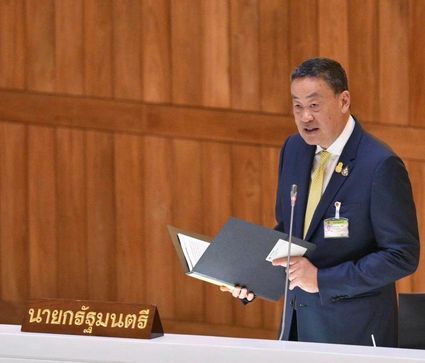Thailand PM urges cautious monetary policy amid economic recovery

Prime Minister Srettha Thavisin urges the Bank of Thailand to consider the potential risks to the country’s delicate economic recovery when making decisions regarding monetary policy.
He expressed concern that the decade-high borrowing costs, currently standing at 2.5%, could potentially impede the nation’s economic revival and affect the populace adversely.
During a parliamentary budget debate, PM Srettha revealed that the proposed 3.48 trillion baht (US$101 billion) budget for the fiscal year ending September 30, would result in a deficit of 693 billion baht (US$20 billion).
This represents a 100 billion baht (US$2.9 billion) increase from the shortfall estimated by the preceding administration in their initial draft.
The 61 year old PM shed light on the Bank of Thailand’s progressive tightening campaign over the past 13 months, which has seen its benchmark repurchase rate increase by a total of 200 basis points.
This course of action was predicated on the assumption of a robust economic recovery.
However, PM Srettha pointed out that the projected third consecutive monthly decline in inflation was indicative of a slowing domestic economy.
Furthermore, the monetary policy going forward should be in line with the economic trend, tighter financial conditions, and additional boosts from government policies, reported Bangkok Post.
The Thai PM also advocated for running a budget deficit on the fiscal front as a means to bolster the economy.
He has consistently described the economy as being in a state of crisis, with weak domestic activity prompting the Pheu Thai Party to propose a 500 billion baht (US$ 14 billion) digital cash handout programme. This initiative has been met with criticism from certain central bankers and economists.
Despite expressing a desire to expedite annual growth to 5% last year, PM Srettha conceded that the gross domestic product (GDP) growth for this year was likely to be between 2.7% and 3.7%.
This is a marginal increase from the 2.5% growth estimated in the previous year.
As the second-largest economy in Southeast Asia, Thailand is grappling with numerous challenges, including the repercussions of El Nino, high household debt, a slowdown in global trade, and geopolitical tensions.
The Bank of Thailand, which held its policy rate steady in November, will conduct its inaugural rate-setting meeting of the year on February 7. The government is slated to announce the full-year 2023 GDP on February 19.








